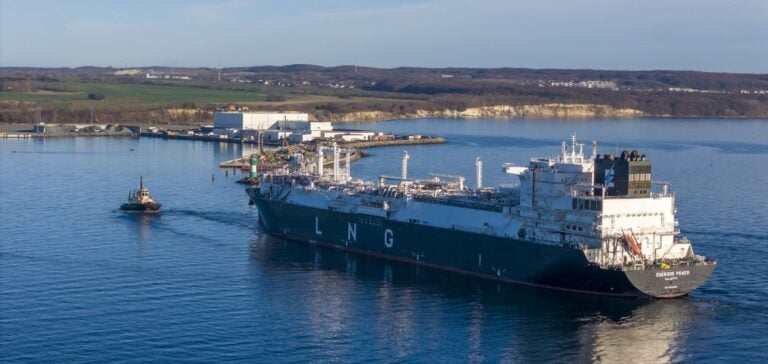The halt in Russian gas deliveries to OMV (Österreichische Mineralölverwaltung), announced on November 16 by Gazprom Export, has forced Austria to explore new options for securing its energy needs. In response, Germany is offering a solution via its liquefied natural gas (LNG) terminal in Mukran, located on Rügen Island.
The Mukran terminal, operated by Deutsche ReGas, has an annual feed-in capacity of 13.5 billion cubic meters (Bcm), more than sufficient to cover Austria’s annual consumption of 7 Bcm. Stephan Knabe, chairman of Deutsche ReGas’s supervisory board, confirmed that this infrastructure, composed of two Floating Storage and Regasification Units (FSRU), has been fully operational since September.
A Strategic Tool for Energy Security
The cut in supplies to OMV stems from a financial dispute concerning arbitration compensation, which the Austrian company deducted from its payments to Gazprom. This development comes amid a broader European effort to prioritize energy security. The Mukran terminal not only strengthens Germany’s energy supply but also supports neighboring countries, in line with the European Union’s principle of energy solidarity.
Through its pipeline network, gas regasified at Mukran can be transported quickly and in large quantities to Austria via Germany and the Czech Republic. This logistical flexibility makes it a strategic solution to address supply interruptions.
The Rise of LNG Infrastructure in Germany
Since the suspension of Russian gas exports in 2022, Germany has accelerated the development of LNG terminals to diversify its energy sources. Mukran is the fourth operational terminal in the country and the only one managed by a private company. The three other terminals, located in Wilhelmshaven and Brunsbüttel, are supported by state funding.
Since December 2022, these infrastructures have allowed Germany to import 9.5 million tons of LNG, equivalent to 13.1 billion cubic meters of gas. Mukran’s significance, as the largest injection point into the national grid, has been reinforced by the growing demand for alternative solutions amid ongoing geopolitical tensions.
A Favorable Regulatory Framework
Germany has adopted legislative measures, such as the LNG Acceleration Act, to enable the rapid construction of these terminals. This legal framework includes temporary exemptions from certain environmental requirements, reducing implementation delays.
These efforts are part of a broader energy strategy that includes strict gas storage obligations. These initiatives allow Germany not only to ensure its own energy resilience but also to support European partners like Austria in emergency situations.
The Mukran terminal demonstrates how LNG infrastructures can play a key role in European energy stability while addressing the challenges posed by the end of Russian supplies.






















